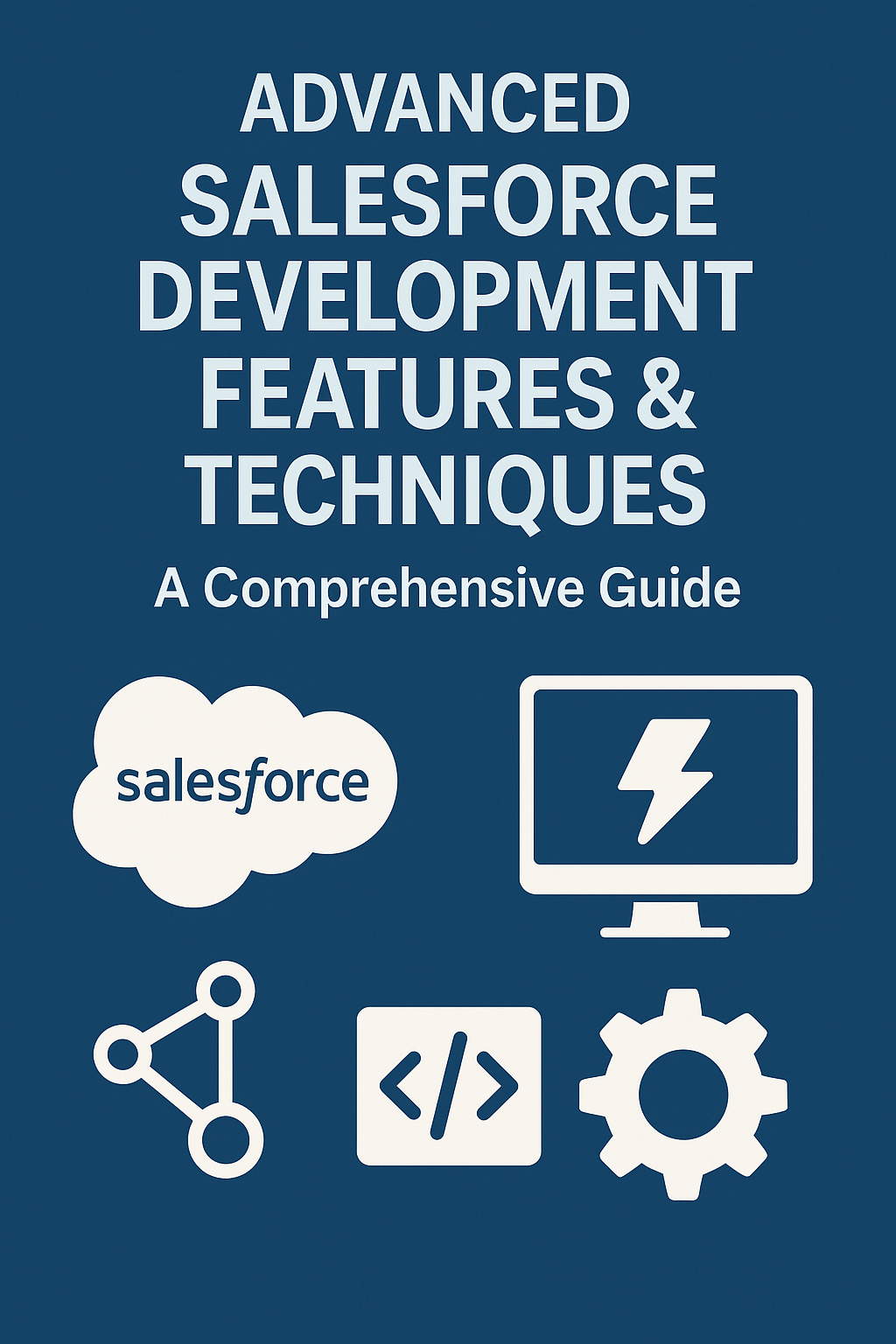Introduction: Taking Your Salesforce Development Skills to the Next Level
In the evolving landscape of customer relationship management, Salesforce stands as the world’s leading CRM platform, providing businesses with powerful tools to manage customer interactions effectively. While basic Salesforce configuration can address many business needs, truly transformative solutions often require advanced development techniques. This comprehensive guide explores the sophisticated development capabilities available in Salesforce, helping developers and administrators unlock the platform’s full potential.
Whether you’re looking to enhance system performance, create custom user experiences, or integrate with external systems, understanding these advanced features will empower you to build more robust and efficient solutions. Let’s dive into the key components of advanced Salesforce development and explore how they can elevate your implementation.
Advanced Apex Programming: Building Powerful Back-End Solutions
Apex, Salesforce’s proprietary programming language, forms the foundation of advanced development on the platform. Designed specifically for the Salesforce ecosystem, Apex provides developers with the tools to create sophisticated business logic and automate complex processes.
Creating Efficient Triggers and Batch Processing
Advanced Apex development involves designing triggers that efficiently handle bulk operations. Unlike basic triggers that might process records individually, advanced implementations follow best practices that:
- Group similar operations to minimize DML statements
- Implement the trigger handler pattern to improve maintainability
- Use static variables to control recursion
- Implement exception handling strategies
Batch Apex allows processing of large data volumes that would otherwise exceed governor limits. Advanced implementations leverage:
global class DataProcessor implements Database.Batchable<sObject> {
global Database.QueryLocator start(Database.BatchableContext bc) {
// Query records to process
return Database.getQueryLocator('SELECT Id, Name FROM Account WHERE LastModifiedDate = TODAY');
}
global void execute(Database.BatchableContext bc, List<Account> scope) {
// Process each batch of records
// Implementation follows bulk patterns
}
global void finish(Database.BatchableContext bc) {
// Post-processing operations
}
}
Advanced Testing Strategies
Production-quality Salesforce development requires comprehensive testing beyond basic coverage requirements:
- Data factories for consistent test data generation
- Mocking frameworks for external system interactions
- Test utility classes for reusable setup and assertion code
- Performance testing under varied data volumes
- Negative testing to validate error handling
Visualforce and Lightning Components: Creating Tailored User Experiences
Visualforce for Complex Interfaces
While Salesforce has shifted focus to Lightning, Visualforce remains valuable for specific use cases:
- Integration with legacy systems
- Complex PDF generation
- Specialized interfaces requiring fine-grained control
Advanced Visualforce implementations leverage:
- Custom controllers and extensions
- JavaScript remoting for asynchronous operations
- Dynamic Visualforce components
- Resource optimization for performance
Lightning Components Framework
The Lightning Component framework enables developers to build responsive, modern interfaces that work across devices. Advanced implementation techniques include:
- Component composition for reusability and maintainability
- Event-driven architecture for component communication
- Base Lightning components to ensure design consistency
- Lightning Data Service for optimized data operations
- Lightning Web Components for modern JavaScript development
Example of a Lightning Web Component structure:
// myComponent.js
import { LightningElement, api, wire } from 'lwc';
import { getRecord } from 'lightning/uiRecordApi';
import ACCOUNT_NAME_FIELD from '@salesforce/schema/Account.Name';
export default class MyComponent extends LightningElement {
@api recordId;
accountName;
@wire(getRecord, { recordId: '$recordId', fields: [ACCOUNT_NAME_FIELD] })
wiredAccount({ error, data }) {
if (data) {
this.accountName = data.fields.Name.value;
} else if (error) {
// Handle error
}
}
}
Integration with External Systems: Connecting Salesforce to Your Ecosystem
Advanced Salesforce implementations rarely exist in isolation. Integration with external systems enhances data flow and enables seamless business processes across platforms.
API Development and Consumption
Salesforce offers multiple API options for different integration needs:
- REST API: For modern, lightweight integrations
- SOAP API: For enterprise systems requiring strict contracts
- Bulk API: For large data volume operations
- Streaming API: For near real-time event notifications
- Connect API: For social and mobile applications
Advanced implementations strategically select the appropriate API based on data volume, synchronicity requirements, and security considerations.
Callout Frameworks and Patterns
External system integration requires robust callout frameworks that handle:
- Authentication and credential management
- Request/response parsing
- Error handling and retry logic
- Rate limiting and throttling
- Mock responses for testing
Example of an advanced callout framework:
public class ExternalServiceCallout {
// Interface for different service implementations
public interface ServiceCallout {
HttpResponse makeCallout(String endpoint, String method, String body);
}
// Implementation with retry logic and error handling
public class ServiceCalloutImpl implements ServiceCallout {
public HttpResponse makeCallout(String endpoint, String method, String body) {
Integer maxRetries = 3;
Integer attemptCount = 0;
while (attemptCount < maxRetries) {
try {
HttpRequest req = buildRequest(endpoint, method, body);
Http http = new Http();
HttpResponse res = http.send(req);
if (res.getStatusCode() == 200) {
return res;
} else if (isRetryableError(res.getStatusCode())) {
// Exponential backoff
attemptCount++;
Integer waitTime = Math.pow(2, attemptCount).intValue() * 1000;
wait(waitTime);
} else {
// Non-retryable error
handleError(res);
return res;
}
} catch (Exception e) {
// Handle exception
}
}
// Max retries exceeded
throw new CalloutException('Maximum retry attempts exceeded');
}
// Helper methods...
}
}
Advanced Process Automation: Beyond Basic Workflows
Flow Builder for Complex Business Logic
Advanced Flow implementations leverage features that extend beyond basic automation:
- Subflows for modular, reusable automation components
- Screen flows with branching logic for guided user experiences
- Autolaunched flows triggered by platform events
- Transaction control for managing complex operations
- Flow testing framework for validation
Combining Declarative and Programmatic Approaches
Truly advanced Salesforce development often combines declarative tools with custom code for optimal solutions:
- Custom Apex actions in Flow
- Process Builder with Apex invocable methods
- Platform events for system communication
- Custom metadata types for configuration
Data Modeling and Management: Designing for Scale
Advanced Object Relationships
Sophisticated Salesforce applications require careful data modeling:
- Junction objects for many-to-many relationships
- Polymorphic relationships for flexible associations
- External objects for real-time integration
- Big Objects for archiving and historical analysis
Optimization Techniques
Performance at scale requires optimization strategies:
- Selective SOQL queries using index-aware filtering
- Asynchronous processing for long-running operations
- Bulkification of all data operations
- Strategic use of formula fields vs. calculated fields
- Cache implementation for frequently accessed data
Security and Sharing: Enterprise-Grade Protection
Advanced Salesforce development implements multiple layers of security:
- Apex sharing for programmatic access control
- Custom permissions for feature-level security
- Field-level encryption for sensitive data
- Shield Platform Encryption for regulatory compliance
- Session security controls and IP restrictions
Example of Apex managed sharing:
public void shareRecordsWithUsers(List<Account> accounts, List<User> users) {
List<AccountShare> sharesToInsert = new List<AccountShare>();
for (Account acc : accounts) {
for (User usr : users) {
AccountShare share = new AccountShare();
share.AccountId = acc.Id;
share.UserOrGroupId = usr.Id;
share.AccountAccessLevel = 'Edit';
share.OpportunityAccessLevel = 'Read';
share.CaseAccessLevel = 'Read';
sharesToInsert.add(share);
}
}
if (!sharesToInsert.isEmpty()) {
Database.SaveResult[] results = Database.insert(sharesToInsert, false);
handleShareResults(results); // Custom error handling
}
}
Deployment Strategies: Enterprise Release Management
Advanced Salesforce development requires sophisticated deployment approaches:
CI/CD Implementation
Modern development teams implement continuous integration and deployment pipelines:
- Source control with Git
- Automated testing with frameworks like Apex PMD
- CI tools like Jenkins or GitHub Actions
- Deployment through Salesforce DX command line
- Package-based development and dependency management
Environment Management
Enterprise implementations maintain multiple environments with controlled promotion:
- Developer sandboxes for individual work
- Integration environments for testing
- UAT environments for user acceptance
- Partial copy sandboxes for data-dependent testing
- Production deployment windows and rollback plans
Advanced AppExchange Development
Creating enterprise-ready AppExchange applications involves:
- Package development with namespaces
- License management and feature entitlement
- Security review preparation
- Upgrade scripts and version compatibility
- Multi-tenant design considerations
Conclusion: Building Your Advanced Salesforce Development Expertise
Advanced Salesforce development represents a significant leap beyond basic configuration and simple customization. By mastering these sophisticated techniques and features, developers can create truly transformative solutions that leverage the full power of the Salesforce platform.
The journey to advanced development expertise requires continuous learning, practical application, and a willingness to explore the boundaries of what’s possible within the Salesforce ecosystem. As you implement these advanced techniques, you’ll find yourself able to solve increasingly complex business challenges and deliver exceptional value to your organization or clients.
Whether you’re building custom applications, integrating with external systems, or optimizing for enterprise scale, these advanced development practices will help you create robust, maintainable, and high-performing Salesforce solutions.
Further Resources
- Apex Developer Guide – Official documentation for advanced Apex development
- Lightning Web Components Developer Guide – Resources for modern component development
- Salesforce Architects – Best practices and patterns for enterprise implementation
- Salesforce DevOps Center – Tools and strategies for CI/CD implementation
- Advanced Apex Programming by Dan Appleman – Deep dive into advanced Apex techniques
- Trailhead – Salesforce’s free learning platform with modules on advanced development topics
- Salesforce Developers Blog – Latest updates and technical articles from the Salesforce development team

